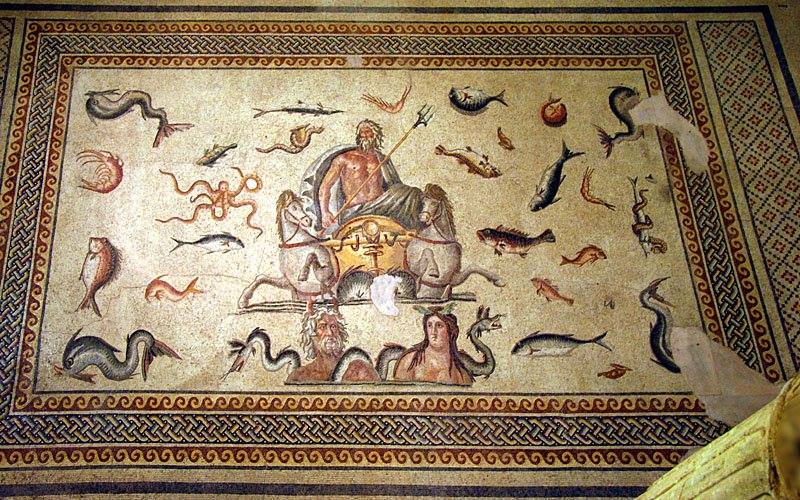Here's Virgil's account, Kline's translation:
When she had spoken these words, fearsome, she sought the earth:
and summoned Allecto, the grief-bringer, from the house
of the Fatal Furies, from the infernal shadows: in whose
mind are sad wars, angers and deceits, and guilty crimes.
A monster, hated by her own father Pluto, hateful
to her Tartarean sisters: she assumes so many forms,
her features are so savage, she sports so many black vipers.
Juno roused her with these words, saying:
‘Grant me a favour of my own, virgin daughter of Night,
this service, so that my honour and glory are not weakened,
and give way, and the people of Aeneas cannot woo
Latinus with intermarriage, or fill the bounds of Italy.
You’ve the power to rouse brothers, who are one, to conflict,
and overturn homes with hatred: you bring the scourge
and the funeral torch into the house: you’ve a thousand names,
and a thousand noxious arts. Search your fertile breast,
shatter the peace accord, sow accusations of war:
let men in a moment need, demand and seize their weapons.’BkVII:341-405 Allecto Maddens Queen Amata
So Allecto, steeped in the Gorgon’s poison, first searches out
Latium and the high halls of the Laurentine king,
and sits at the silent threshold of Queen Amata, whom
concerns and angers have troubled, with a woman’s passion,
concerning the Trojan’s arrival, and Turnus’s marriage.
The goddess flings a snake at her from her dark locks,
and plunges it into the breast, to her innermost heart, so that
maddened by the creature, she might trouble the whole palace.
Sliding between her clothing, and her polished breast,
it winds itself unfelt and unknown to the frenzied woman,
breathing its viperous breath: the powerful snake becomes her
twisted necklace of gold, becomes the loop of her long ribbon,
knots itself in her hair, and roves slithering down her limbs.
And while at first the sickness, sinking within as liquid venom,
pervades her senses, and clasps her bones with fire,
and before her mind has felt the flame through all its thoughts,
she speaks, softly, and in a mother’s usual manner,
weeping greatly over the marriage of her daughter to the Trojan:
‘O, have you her father no pity for your daughter or yourself?
Have you no pity for her mother, when the faithless seducer
will leave with the first north-wind, seeking the deep, with the girl
as prize? Wasn’t it so when Paris, that Phrygian shepherd,
entered Sparta, and snatched Leda’s Helen off to the Trojan cities?
What of your sacred pledge? What of your former care for your own
people, and your right hand given so often to your kinsman Turnus?
If a son-in-law from a foreign tribe is sought for the Latins,
and it’s settled, and your father Faunus’s command weighs on you,
then I myself think that every land free of our rule
that is distant, is foreign: and so the gods declare.
Note the forebears of Turnus whom she names:
And if the first origins of his house are traced, Inachus
and Acrisius are ancestors of Turnus, and Mycenae his heartland.’
When, though trying in vain with words, she sees Latinus
stand firm against her, and when the snake’s maddening venom
has seeped deep into her flesh, and permeated throughout,
then, truly, the unhappy queen, goaded by monstrous horrors,
rages madly unrestrainedly through the vast city.
As a spinning-top, sometimes, that boys intent on play thrash
in a circle round an empty courtyard, turns under the whirling lash,
- driven with the whip it moves in curving tracks: and the childish crowd
marvel over it in innocence, gazing at the twirling boxwood:
and the blows grant it life: so she is driven through the heart
of cities and proud peoples, on a course that is no less swift.
Moreover, she runs to the woods, pretending Bacchic possession,
setting out on a greater sin, and creating a wider frenzy,
and hides her daughter among the leafy mountains,
to rob the Trojans of their wedding and delay the nuptials,
shrieking ‘Euhoe’ to Bacchus, crying ‘You alone are worthy
of this virgin: it’s for you in truth she lifts the soft thyrsus,
you she circles in the dance, for you she grows her sacred hair.’
Rumour travels: and the same frenzy drives all the women,
inflamed, with madness in their hearts, to seek strange shelter.
They leave their homes, and bare their head and neck to the winds:
while others are already filling the air with vibrant howling
carrying vine-wrapped spears, and clothed in fawn-skins.
The wild Queen herself brandishes a blazing pine-branch
in their midst, turning her bloodshot gaze on them, and sings
the wedding-song for Turnus and her daughter, and, suddenly
fierce, cries out: ‘O, women of Latium, wherever you are, hear me:
if you still have regard for unhappy Amata in your pious hearts,
if you’re stung with concern for a mother’s rights,
loose the ties from your hair, join the rites with me.’
So Allecto drives the Queen with Bacchic goad, far and wide,
through the woods, among the wild creatures’ lairs.


No comments:
Post a Comment